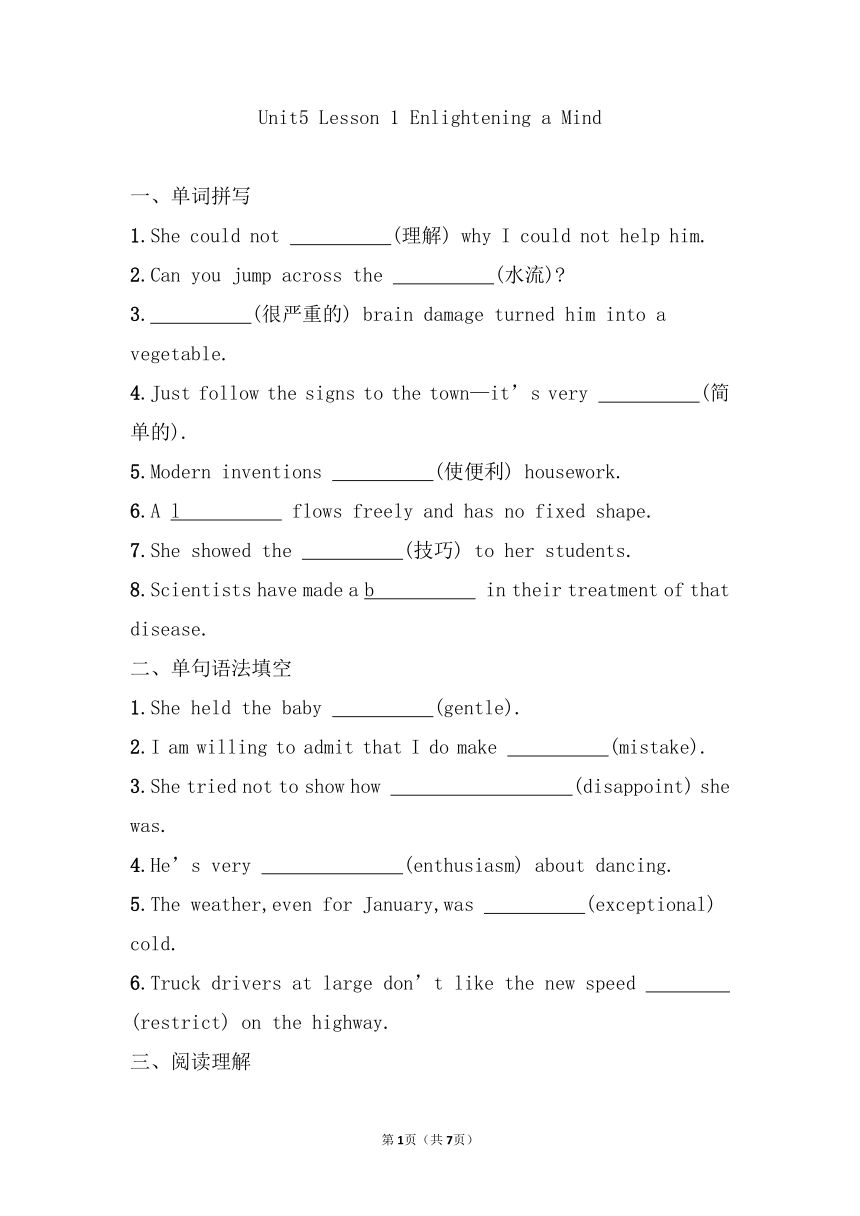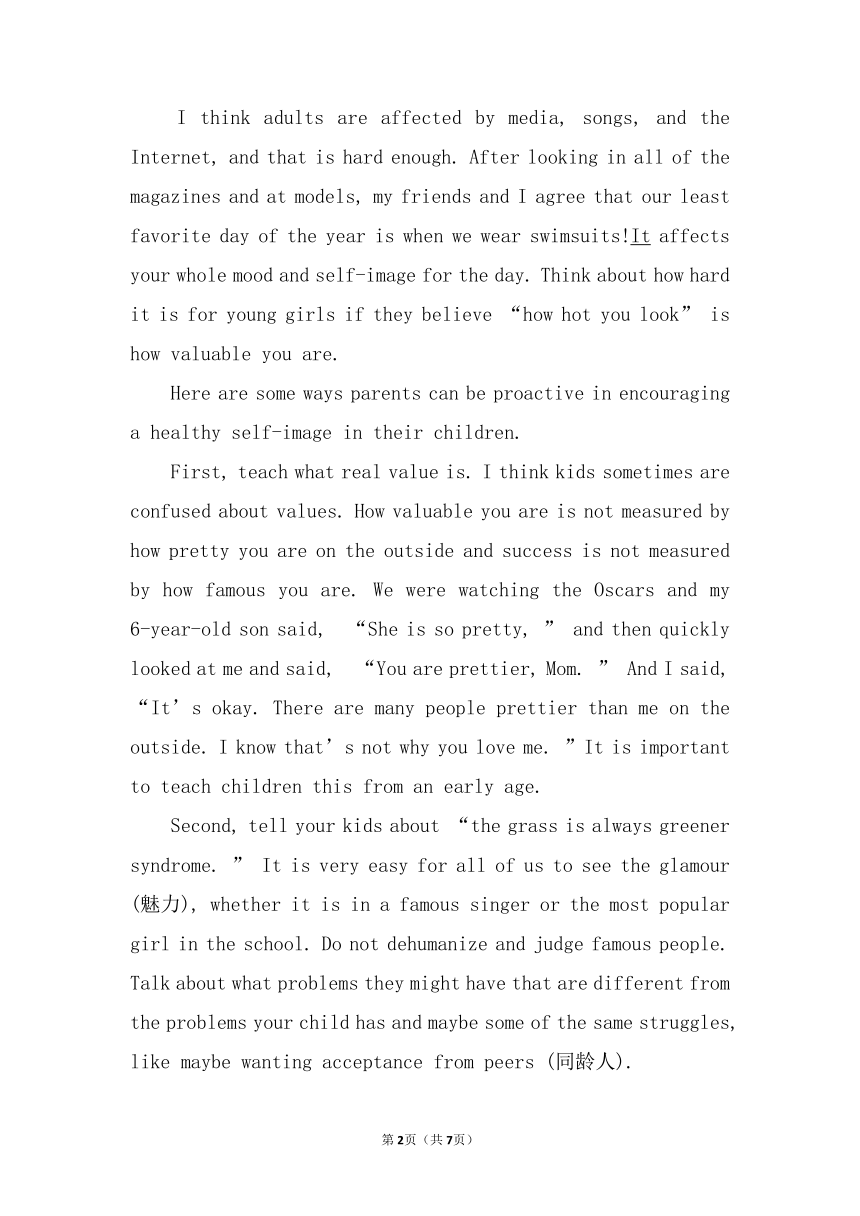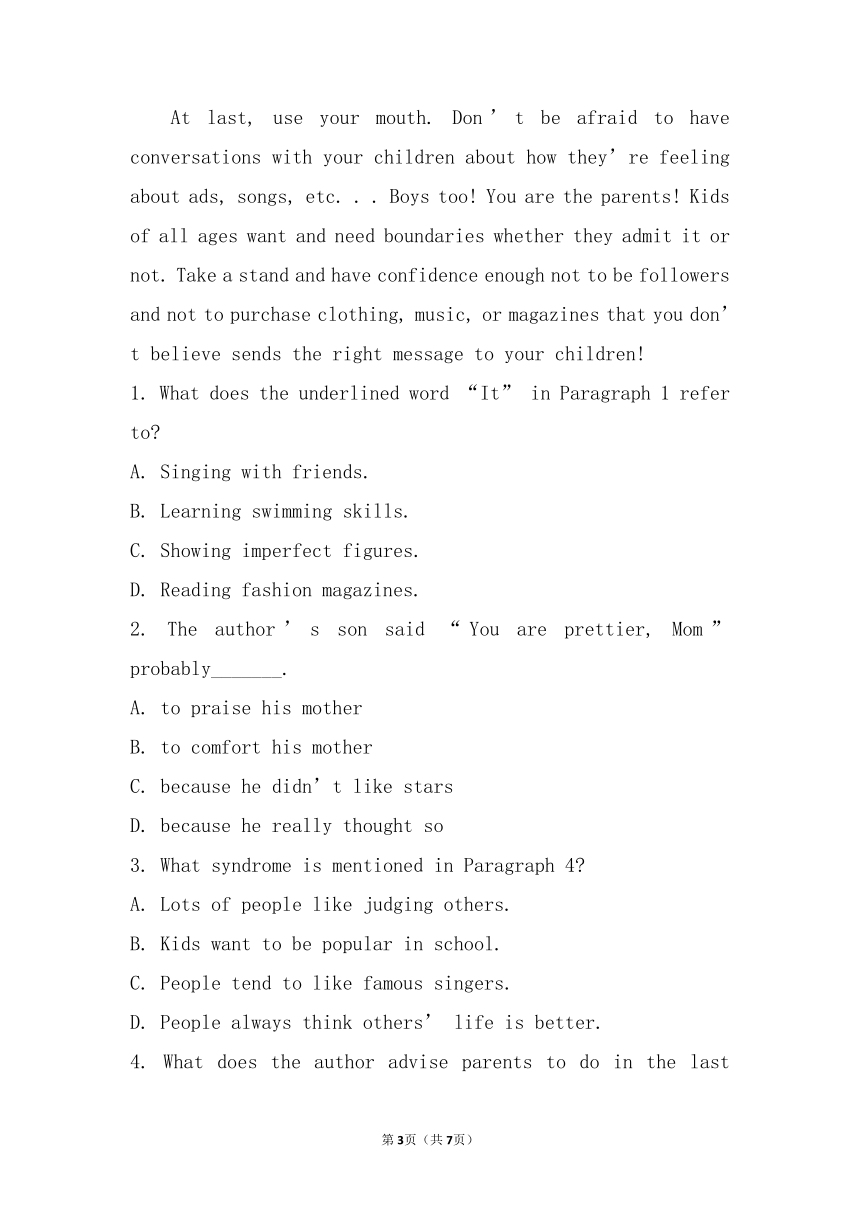北师大版(2019)选择性必修第二册Unit 5 Education Lesson 1 Enlightening a Mind 强化练习(含答案)
文档属性
| 名称 | 北师大版(2019)选择性必修第二册Unit 5 Education Lesson 1 Enlightening a Mind 强化练习(含答案) |

|
|
| 格式 | zip | ||
| 文件大小 | 37.0KB | ||
| 资源类型 | 教案 | ||
| 版本资源 | 北师大版(2019) | ||
| 科目 | 英语 | ||
| 更新时间 | 2021-11-13 00:00:00 | ||
图片预览



文档简介
Unit5 Lesson 1 Enlightening a Mind
一、单词拼写
1.She could not (理解) why I could not help him.
2.Can you jump across the (水流)
3. (很严重的) brain damage turned him into a vegetable.
4.Just follow the signs to the town—it’s very (简单的).
5.Modern inventions (使便利) housework.
6.A l flows freely and has no fixed shape.
7.She showed the (技巧) to her students.
8.Scientists have made a b in their treatment of that disease.
二、单句语法填空
1.She held the baby (gentle).
2.I am willing to admit that I do make (mistake).
3.She tried not to show how (disappoint) she was.
4.He’s very (enthusiasm) about dancing.
5.The weather,even for January,was (exceptional) cold.
6.Truck drivers at large don’t like the new speed (restrict) on the highway.
三、阅读理解
I think adults are affected by media, songs, and the Internet, and that is hard enough. After looking in all of the magazines and at models, my friends and I agree that our least favorite day of the year is when we wear swimsuits!It affects your whole mood and self-image for the day. Think about how hard it is for young girls if they believe “how hot you look” is how valuable you are.
Here are some ways parents can be proactive in encouraging a healthy self-image in their children.
First, teach what real value is. I think kids sometimes are confused about values. How valuable you are is not measured by how pretty you are on the outside and success is not measured by how famous you are. We were watching the Oscars and my 6-year-old son said, “She is so pretty, ” and then quickly looked at me and said, “You are prettier, Mom. ” And I said, “It’s okay. There are many people prettier than me on the outside. I know that’s not why you love me. ”It is important to teach children this from an early age.
Second, tell your kids about “the grass is always greener syndrome. ” It is very easy for all of us to see the glamour (魅力), whether it is in a famous singer or the most popular girl in the school. Do not dehumanize and judge famous people. Talk about what problems they might have that are different from the problems your child has and maybe some of the same struggles, like maybe wanting acceptance from peers (同龄人).
At last, use your mouth. Don’t be afraid to have conversations with your children about how they’re feeling about ads, songs, etc. . . Boys too! You are the parents! Kids of all ages want and need boundaries whether they admit it or not. Take a stand and have confidence enough not to be followers and not to purchase clothing, music, or magazines that you don’t believe sends the right message to your children!
1. What does the underlined word “It” in Paragraph 1 refer to
A. Singing with friends.
B. Learning swimming skills.
C. Showing imperfect figures.
D. Reading fashion magazines.
2. The author’s son said “You are prettier, Mom” probably_______.
A. to praise his mother
B. to comfort his mother
C. because he didn’t like stars
D. because he really thought so
3. What syndrome is mentioned in Paragraph 4
A. Lots of people like judging others.
B. Kids want to be popular in school.
C. People tend to like famous singers.
D. People always think others’ life is better.
4. What does the author advise parents to do in the last paragraph
A. Set limits for their kids.
B. Make friends with their kids.
C. Teach their kids how to be confident.
D. Encourage their kids to be themselves.
四、语法填空
China held a meeting on Tuesday morning at the Great Hall of the People in Beijing 1. _______ (praise) role models in the country’s fight against the COVID-19 epidemic, which is now 2. _______ (large) being kept under control in China.
Before the meeting, Chinese leaders led by Xi Jinping met with role models in the fight and had a group photo with them.
After the meeting began, participants observed a moment of silence for every life 3. _______ (lose) due to COVID-19. Then, President Xi Jinping 4. _______ (present) medals to recipients (接 受 者 )of the Medal of the Republic and the national honorary title for 5. _______ (they) outstanding contributions 6. _______ the country’s fight against the COVID-19 epidemic.
The Medal of the Republic was awarded on the famous respiratory(呼吸的) disease expert Zhong Nanshan. The national honorary title, “the People’s Hero”, was awarded to Zhang Boli, 7. _______ Chinese expert in medicine, who led the research of the COVID-19 treatment scheme combining 8. _______ (tradition) Chinese medicine and Western medicine, Zhang Dingyu, head of Wuhan’s coronavirus-treating Jinyintan Hospital, and Chen Wei, 9. _______ is a military medical scientist, making major achievements in COVID-19-related basic research, 10. _______ (develop) of vaccine and protective medicine.
一、单词拼写
1.grasp
2.stream
3.Severe
4.straightforward
5.facilitate
6.liquid
7.technique
8.breakthrough
二、单句语法填空
1.gently
2.mistakes
3.disappointed
4.enthusiastic
5.exceptionally
6.restriction
三、阅读理解
1.C。词义猜测题。根据第一段中“After looking in all of the magazines and at models. . . when we wear swimsuits”及下文的how hot you look可知, 画线词指代“穿上泳衣后展示出不完美的身材”。
2.B。推理判断题。根据第三段中We were watching the Oscars and my 6-year-old son said, “She is so pretty, ” and then quickly looked at me and said. . . 及下文作者的话It’s okay. There are many people prettier than me on the outside可知, 作者的儿子那样说可能只是为了安慰自己的妈妈。
3.D。推理判断题。根据第四段中the grass is always greener syndrome及It is very easy for all of us to see the glamour. . . Talk about what problems they might have可知, 作者认为人们通常更容易看到别人好的地方, 而忽视别人不如意的地方。
4.A。细节理解题。根据最后一段中You are the parents!Kids of all ages want and need boundaries whether they admit it or not可知, 作者建议家长们适当限制孩子们接触的东西。
四、语法填空
1. to praise。考查非谓语动词。不定式用作目的状语。
2. largely。考查副词。副词作状语, 修饰being kept。
3. lost。考查非谓语动词。过去分词短语作后置定语, 修饰life。
4. presented。考查时态。根据前后语境, 该句应用过去时。
5. their。考查代词。修饰名词contributions, 用形容词性物主代词。
6. to。考查介词。contributions to“对……的贡献”。
7. a。考查冠词。根据句意“一个中国医学专家”, 故用不定冠词a。
8.traditional。考查形容词。修饰名词Chinese medicine, 用形容词形式。
9.who。考查定语从句。who引导定语从句, 修饰先行词Chen Wei, who在定语从句中作主语。
10.development。考查名词。与research和protective medicine并列, 作介词in的宾语。
第9页(共9页)
一、单词拼写
1.She could not (理解) why I could not help him.
2.Can you jump across the (水流)
3. (很严重的) brain damage turned him into a vegetable.
4.Just follow the signs to the town—it’s very (简单的).
5.Modern inventions (使便利) housework.
6.A l flows freely and has no fixed shape.
7.She showed the (技巧) to her students.
8.Scientists have made a b in their treatment of that disease.
二、单句语法填空
1.She held the baby (gentle).
2.I am willing to admit that I do make (mistake).
3.She tried not to show how (disappoint) she was.
4.He’s very (enthusiasm) about dancing.
5.The weather,even for January,was (exceptional) cold.
6.Truck drivers at large don’t like the new speed (restrict) on the highway.
三、阅读理解
I think adults are affected by media, songs, and the Internet, and that is hard enough. After looking in all of the magazines and at models, my friends and I agree that our least favorite day of the year is when we wear swimsuits!It affects your whole mood and self-image for the day. Think about how hard it is for young girls if they believe “how hot you look” is how valuable you are.
Here are some ways parents can be proactive in encouraging a healthy self-image in their children.
First, teach what real value is. I think kids sometimes are confused about values. How valuable you are is not measured by how pretty you are on the outside and success is not measured by how famous you are. We were watching the Oscars and my 6-year-old son said, “She is so pretty, ” and then quickly looked at me and said, “You are prettier, Mom. ” And I said, “It’s okay. There are many people prettier than me on the outside. I know that’s not why you love me. ”It is important to teach children this from an early age.
Second, tell your kids about “the grass is always greener syndrome. ” It is very easy for all of us to see the glamour (魅力), whether it is in a famous singer or the most popular girl in the school. Do not dehumanize and judge famous people. Talk about what problems they might have that are different from the problems your child has and maybe some of the same struggles, like maybe wanting acceptance from peers (同龄人).
At last, use your mouth. Don’t be afraid to have conversations with your children about how they’re feeling about ads, songs, etc. . . Boys too! You are the parents! Kids of all ages want and need boundaries whether they admit it or not. Take a stand and have confidence enough not to be followers and not to purchase clothing, music, or magazines that you don’t believe sends the right message to your children!
1. What does the underlined word “It” in Paragraph 1 refer to
A. Singing with friends.
B. Learning swimming skills.
C. Showing imperfect figures.
D. Reading fashion magazines.
2. The author’s son said “You are prettier, Mom” probably_______.
A. to praise his mother
B. to comfort his mother
C. because he didn’t like stars
D. because he really thought so
3. What syndrome is mentioned in Paragraph 4
A. Lots of people like judging others.
B. Kids want to be popular in school.
C. People tend to like famous singers.
D. People always think others’ life is better.
4. What does the author advise parents to do in the last paragraph
A. Set limits for their kids.
B. Make friends with their kids.
C. Teach their kids how to be confident.
D. Encourage their kids to be themselves.
四、语法填空
China held a meeting on Tuesday morning at the Great Hall of the People in Beijing 1. _______ (praise) role models in the country’s fight against the COVID-19 epidemic, which is now 2. _______ (large) being kept under control in China.
Before the meeting, Chinese leaders led by Xi Jinping met with role models in the fight and had a group photo with them.
After the meeting began, participants observed a moment of silence for every life 3. _______ (lose) due to COVID-19. Then, President Xi Jinping 4. _______ (present) medals to recipients (接 受 者 )of the Medal of the Republic and the national honorary title for 5. _______ (they) outstanding contributions 6. _______ the country’s fight against the COVID-19 epidemic.
The Medal of the Republic was awarded on the famous respiratory(呼吸的) disease expert Zhong Nanshan. The national honorary title, “the People’s Hero”, was awarded to Zhang Boli, 7. _______ Chinese expert in medicine, who led the research of the COVID-19 treatment scheme combining 8. _______ (tradition) Chinese medicine and Western medicine, Zhang Dingyu, head of Wuhan’s coronavirus-treating Jinyintan Hospital, and Chen Wei, 9. _______ is a military medical scientist, making major achievements in COVID-19-related basic research, 10. _______ (develop) of vaccine and protective medicine.
一、单词拼写
1.grasp
2.stream
3.Severe
4.straightforward
5.facilitate
6.liquid
7.technique
8.breakthrough
二、单句语法填空
1.gently
2.mistakes
3.disappointed
4.enthusiastic
5.exceptionally
6.restriction
三、阅读理解
1.C。词义猜测题。根据第一段中“After looking in all of the magazines and at models. . . when we wear swimsuits”及下文的how hot you look可知, 画线词指代“穿上泳衣后展示出不完美的身材”。
2.B。推理判断题。根据第三段中We were watching the Oscars and my 6-year-old son said, “She is so pretty, ” and then quickly looked at me and said. . . 及下文作者的话It’s okay. There are many people prettier than me on the outside可知, 作者的儿子那样说可能只是为了安慰自己的妈妈。
3.D。推理判断题。根据第四段中the grass is always greener syndrome及It is very easy for all of us to see the glamour. . . Talk about what problems they might have可知, 作者认为人们通常更容易看到别人好的地方, 而忽视别人不如意的地方。
4.A。细节理解题。根据最后一段中You are the parents!Kids of all ages want and need boundaries whether they admit it or not可知, 作者建议家长们适当限制孩子们接触的东西。
四、语法填空
1. to praise。考查非谓语动词。不定式用作目的状语。
2. largely。考查副词。副词作状语, 修饰being kept。
3. lost。考查非谓语动词。过去分词短语作后置定语, 修饰life。
4. presented。考查时态。根据前后语境, 该句应用过去时。
5. their。考查代词。修饰名词contributions, 用形容词性物主代词。
6. to。考查介词。contributions to“对……的贡献”。
7. a。考查冠词。根据句意“一个中国医学专家”, 故用不定冠词a。
8.traditional。考查形容词。修饰名词Chinese medicine, 用形容词形式。
9.who。考查定语从句。who引导定语从句, 修饰先行词Chen Wei, who在定语从句中作主语。
10.development。考查名词。与research和protective medicine并列, 作介词in的宾语。
第9页(共9页)
同课章节目录
- Unit 4 Humour
- Lesson 1 What’s So Funny?
- Lesson 2 Why Do We Need Humour?
- Lesson 3 My Favourite Comedian
- Unit 5 Education
- Lesson 1 Enlightening a Mind
- Lesson 2 The Objectives of Education
- Lesson 3 Understanding
- Unit 6 The Media
- Lesson 1 From Page to Screen
- Lesson 2 Questions about Media
- Lesson 3 The Advertising Game
